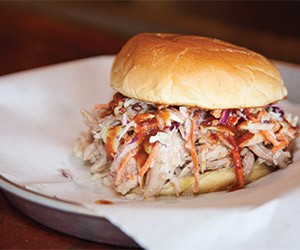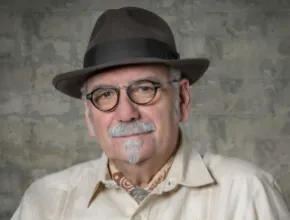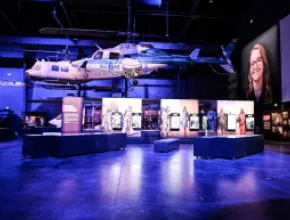From the Mississippi Delta to the Great Smoky Mountains, Tennessee is abundant with sites pertaining to America’s social and cultural heritage and the fascinating individuals who contributed to its development. Whether it’s tracing family roots at the Alex Haley Museum and Interpretive Center or exploring the contradictory life of Andrew Jackson at The Hermitage, there are rewarding ways for groups to engage and connect at venues throughout the state.
National Civil Rights Museum, Memphis
Through interactive and immersive exhibits, the National Civil Rights Museum, which completed a major renovation and expansion in 2014, takes visitors on a journey through enslavement, Jim Crow laws, boycotts and freedom marches, the Black Power movement and much more. Visitors can listen to Dr. Martin Luther King Jr. reading the famous Letter from a Birmingham Jail and a phone conversation between King and President Lyndon Johnson strategizing passage of the Voting Rights Act. One of its most arresting features is how the museum campus incorporates the Lorraine Motel, site of the King assassination, with its Mid-Century facade and 1960s-era vehicles parked in front.
“This is truly one of the most important museums in our country, so any meeting planner looking for an outside venue in Memphis should really consider it,” said Cindy Dupree, spokesperson for the Tennessee Department of Tourism. “It really captures the defining moments of the Civil Rights Movement.”
Available for events of up to 275 people, the museum offers function spaces that include an auditorium equipped for presentations, conference room, banquet room and outdoor reception areas.
Slave Haven Underground Railroad Museum, Memphis
A modest white antebellum house north of downtown, Slave Haven Underground Railroad Museum is where Jakob Burkle, a German immigrant and local businessman, secretly assisted runaway slaves on their escape to freedom.
“The house is just two blocks from the Mississippi River where slaves could be stowed away on boats up to the Ohio River and then to Canada,” said Elaine Turner, director of the museum and owner of Heritage Tours, which provides history-focused tours of Memphis for meeting groups.
Visitors can descend the narrow steps of the cellar to peer through trap doors and hidden passageways where fugitives nervously awaited signals that it was safe to continue their journey to the river. Throughout the house are historic documents, slavery relics and a display of quilts made by enslaved people with symbolic meanings woven into their designs.
“The quilts are filled with hidden codes such as flying geese or the North Star, which have to do with the escape to freedom,” Turner said. “We still don’t know what they all mean.”
Alex Haley Museum and Interpretive Center, Henning
Alex Haley, the Pulitzer Prize-winning author of Roots: The Saga of an American Family and The Autobiography of Malcolm X, spent much of his childhood in the 1918 bungalow that is part of this museum complex 50 miles northeast of Memphis in Henning. The front porch is where Haley first heard his grandparents give accounts of family history, including the story of Kunta Kinte, the young Mandingo man captured near his West African home and taken to America.
Also on the grounds is a stunning Interpretive Center with soaring glass walls overlooking green spaces. Visitors can view a documentary film and explore galleries devoted to events from Haley’s life, including his search to learn more about his African ancestry, a quest that led to the acclaimed novel and TV miniseries Roots. The center, which is available for events, also includes a life-size replica of a slave ship and a Genealogy Room where visitors can learn about tracing their own family histories.
Country Music Hall of Fame and Museum, Nashville
The roots and evolution of country music told through archival videos, touchscreens, original recordings and newly produced films are the focus of this dazzling centerpiece of Nashville’s Fifth Avenue arts and entertainment district. Its permanent gallery traces country music from its pre-commercial roots in the 19th century on up through the contemporary scene. Visitors can peer into the glass-walled central archive to observe staff working on historical artifacts and recordings.
Function spaces include the 10,000-square-foot Event Hall, which has 40-foot glass walls framing views of downtown, and the 4,500-square-foot circular Hall of Fame Rotunda lined with bronze plaques honoring the performers and producers who shaped country music. Other options include the 800-seat CMA Theater, a live-music venue adaptable for meetings.
PageBreak
Andrew Jackson’s Hermitage, Nashville
The contradictory life of the seventh president is vividly illustrated just outside downtown Nashville at Andrew Jackson’s Hermitage, which is considered the most authentically preserved presidential home in the U.S. The sprawling estate includes a stately mansion filled with original furnishings and a spacious visitor center with an exhibit called Born for the Storm filled with memorabilia from Jackson’s military and presidential career, including his inaugural carriage and sword from the Battle of New Orleans.
“Jackson was an enigma—a great war hero who also owned 150 slaves and relocated Native Americans on the Trail of Tears,” said marketing director Jason Nelson. “He was famous for fighting duels and yet fought in only three.”
While the main mansion itself is not available for events, The Hermitage offers several atmospheric indoor and outdoor function spaces, including the Cabin-by-the-Spring, a log farmhouse surrounded by lush gardens that accommodates up to 225 people for a reception. Other areas include Tulip Grove Mansion, a Greek Revival-style mansion built for Jackson’s nephew that has a sprawling lawn available for events.
“We can do carriage rides around the grounds for groups—things that really give people a feel for the history of the place,” Nelson said.
Belmont Mansion, Nashville
Located on a hilltop on the campus of Nashville’s Belmont College, Belmont Mansion was the elegant summer home of Adelicia Acklen, one of the city’s most prominent and dynamic women of the pre-Civil War era. Designed in the style of an Italian villa with such innovations as a bowling alley, Belmont is filled with European paintings, sculpture and exquisite decorative items. The mansion is open for public tours and can host dinner and lunch events for up to 50 people.
“Belmont really reflects the life and style of its owner, a true Scarlett O’Hara who married three times and was famous for her beauty and independence,” said Carol Norfleet, executive vice president of Destination Nashville, a DMC. “You can do a really beautiful event there in combination with a tour of the mansion.”
Bessie Smith Cultural Center, Chattanooga
Named for the legendary “Empress of the Blues,” who was born in Chattanooga in 1892, the Bessie Smith Cultural Center focuses on the contributions black citizens made to the development of Chattanooga. Exhibits chronicle local events during the Civil Rights era and showcase the lives of Smith and others who hailed from the city, including Willie Mays and Samuel L. Jackson.
The cultural center and its extensive grounds offer numerous spaces for events, including the Bessie Smith Performance Hall, which seats up to 240 people and offers a catering kitchen. Groups of up to 1,000 can enjoy receptions on the Museum Terrace and adjoining lawn, while the Vilma Fields Atrium hosts receptions for up to 175 guests and the Big Nine Board Room seats up to 20.
Great Smoky Mountains Heritage Center, Townsend
The cultural history of east Tennessee is the focus of this museum and historic building complex located near an entrance to Great Smoky Mountains National Park. In the main gallery are exhibits devoted to Native Americans, mountain pioneers and artwork from the Tennessee Artists Association. The Historic Village is home to 13 buildings furnished according to the period in which they were built, among them cantilevered barns, a log cabin, smokehouse, wheelwright shop and others.
Groups can hold events in an authentic log cabin or engage in teambuilding exercises in outdoor areas such as the new Native American games field. The heritage center can also host workshops, seminars and conferences in rooms with mountain views.
Discovery Park of America, Union City
American history, along with science and technology, is the focus of this 50-acre park developed and conceived by businessman Robert Kirkland and located in the northwestern corner of the state. Its Discovery Center offers dinosaur skeletons, a 20,000-gallon aquarium, earthquake simulator, interactive spaceship and planetarium. The grounds contain historic log structures, a barn with antique tractors, a depot with vintage trains, gardens, a late-19th century church and a town square with a replica of the Liberty Bell.
The Discovery Center hosts receptions for up to 500 people, while a tower room with panoramic views seats up to 40. A hillside amphitheater can host up to 4,000.







